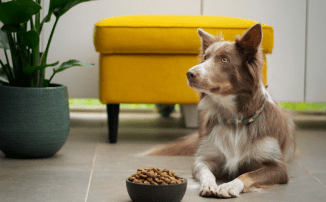The UK has become the first country in Europe to approve the sale of lab-grown meat, but for dogs and cats for now. This special variety of meat, manufactured by a company named Meatly, is grown in a lab from chicken cells. It’s kind of like a paste you feed your pets.

What is Lab-Grown Meat?
Lab-grown meat, also known as cultivated meat, involves drawing a small sample from a chicken egg and then growing it in a lab with vitamins and other nutrients. The cells train in containers, very much similar to the brew of beer. Finally, this comes out with a meat-like paste.
Why Lab-Grown Pet Food?
Many pet owners in the world are fond of animals and thus always experience twinges of guilt while serving their pets slaughterhouse meat. In vitro meat, however, could provide a solution. It’s made without harming animals, and it has less of an impact on the environment. Indeed, research indicates that the carbon footprint of the pet food industry is as huge as that of the Philippines, the 13th largest country in the world by population.
Approval and Production
The UK’s Animal and Plant Health Agency and the Department for Environment, Food and Rural Affairs have approved lab-grown chicken by Meatly to be used as pet food. Meatly is also ready with its production facility to roll out this special pet food. Plans are to start selling this year and, in three years, they plan to make it more competitive in price and accessible to all by mixing it with vegetables.

Funding and Further Plans
Meatly has already secured £3.5 million from investors, with another £5 million expected to come on board soon. It also has its eyes set on cost-cutting measures and increasing production.
Human Consumption Next?
The former UK government was looking into fast-tracking the accreditation process for lab-grown meat safe for human consumption. The Food Standards Agency brings out guidelines on how that might occur. From bringing about more secure food, to helping sustainable agriculture, some perceives great potential within lab developed meat.
Global Perspective
Nonetheless, Singapore and Israel are some of the countries where cultured meat has become customary for human consumption; some places—for instance, states in the US, like Florida or Alabama—have banned the consumption of such meat due to the presumption that it is eventually going to hurt traditional livestock farming.

Experts’ Opinions
According to Linus Pardoe of the Good Food Institute Europe, the UK tops in its developing lab-grown meat. He felt it was a giant step to accept lab-grown food for pets. According to Pardoe, intensive animal farming has many evils which could be averted by this new meat. A further point to succeed with the laboratory-grown meat is that the government has to finance research and development and engineering infrastructure that makes this meat tasty and cheap with its availability to all.
Conclusion:
That lab-grown food for pets has just been approved in the UK is very interesting. It is a clear indicator of shifting toward more sustainable and ethical methods of food production. Sooner than expected, with technological advancements and continued research efforts, lab-grown meat could constitute part of our daily diet in order to save the lives of animals and our endangered environment.
The UK is the first country in Europe to legalize the manufacture of lab-grown pet food. The company, Meatly, created this meat using chicken cells, and for this reason and because of these two reasons, it’s a very humane and eco-friendly option for animals compared to traditional pet food. As this technology continues to progress, the lab-grown version of the meat might soon be allowed for human consumption.








